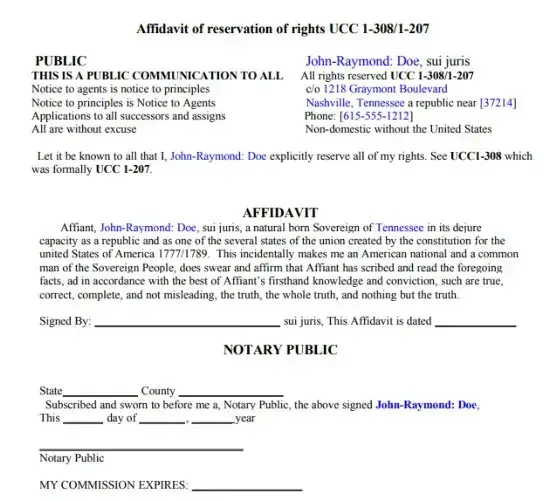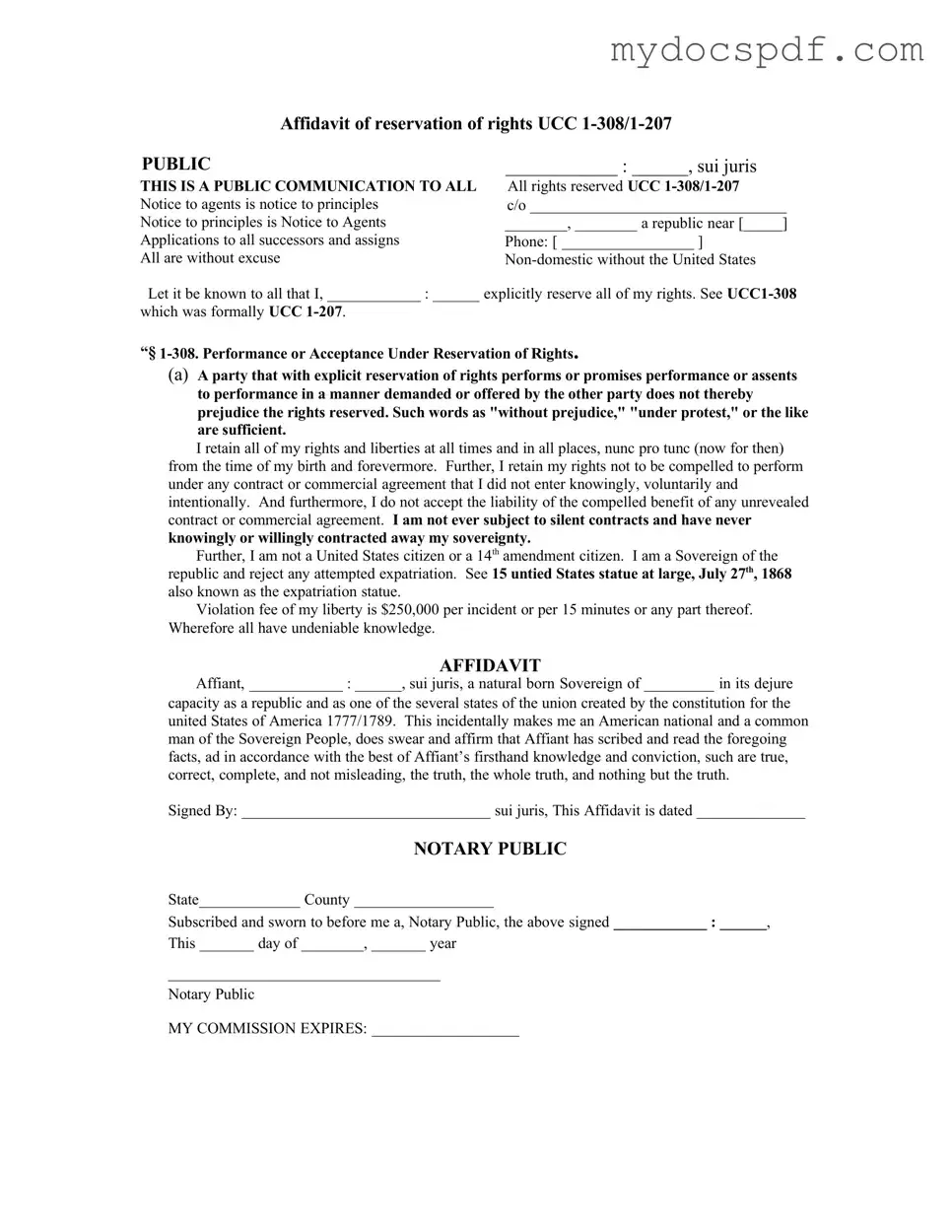Get Ucc 1 308 Form in PDF
The UCC 1-308 form, also known as the Affidavit of Reservation of Rights, serves an important purpose for individuals who wish to assert their rights within the framework of commercial transactions. This form allows a person to explicitly reserve their rights while engaging in a contract or agreement, ensuring that they do not unintentionally waive any legal protections. By including phrases such as "without prejudice" or "under protest," the individual clearly communicates their intention to retain all rights, liberties, and sovereign status. The UCC 1-308 form is rooted in the Uniform Commercial Code, which governs commercial transactions in the United States, and it provides a mechanism for individuals to protect themselves from being bound by agreements they did not enter into knowingly or voluntarily. Furthermore, the form emphasizes that the signer is not subject to silent contracts and maintains a clear distinction between their status as a sovereign individual and that of a U.S. citizen. This affidavit serves as a public declaration, informing all parties involved, including agents and principals, of the signer's reserved rights and their commitment to uphold those rights in any commercial dealings.
Dos and Don'ts
When filling out the UCC 1-308 form, there are certain best practices to follow and some common pitfalls to avoid. Here’s a helpful list:
- Do ensure all personal information is accurate and complete.
- Do clearly state your intention to reserve rights in the appropriate section.
- Do sign the affidavit in the presence of a notary public.
- Do keep a copy of the completed form for your records.
- Don't leave any fields blank unless instructed otherwise.
- Don't use vague language; be explicit about your rights and intentions.
- Don't rush through the process; take your time to ensure accuracy.
- Don't forget to check the expiration date of the notary's commission.
Document Attributes
| Fact Name | Fact Description |
|---|---|
| Purpose | The UCC 1-308 form is used to explicitly reserve rights in legal and commercial transactions. |
| Legal Basis | This form is governed by the Uniform Commercial Code (UCC), specifically UCC § 1-308. |
| Reservation of Rights | Filing this form allows individuals to perform under a contract while reserving their rights. |
| State-Specific Variations | Each state may have its own specific requirements or variations related to the UCC 1-308 form. |
| Public Communication | The form serves as a public notice to all parties regarding the reservation of rights. |
| Affidavit Requirement | An affidavit must accompany the UCC 1-308 form, affirming the truth of the statements made. |
| Expatriation Reference | The form references the expatriation statute, indicating the individual's status as a sovereign. |
Key takeaways
Filling out and using the UCC 1-308 form requires attention to detail and understanding of your rights. Here are key takeaways to consider:
- Explicit Reservation of Rights: Clearly state that you are reserving all your rights. Use phrases like "without prejudice" or "under protest" to reinforce your position.
- Personal Information: Fill in your name and address accurately. Ensure that all contact details are current and correct.
- Affidavit Requirement: Include an affidavit that confirms your status as a natural born Sovereign and your understanding of the rights you are reserving.
- Notary Public: Have the document notarized. This adds legitimacy and verifies your identity.
- Understanding Sovereignty: Make it clear that you do not identify as a United States citizen under the 14th amendment. State your status as a Sovereign of the republic.
- Violation Fees: Specify any fees for violations of your rights. This can serve as a deterrent against infringement.
- Public Communication: Treat the document as a public communication. This means it should be accessible and understood by all parties involved.
- Documentation: Keep a copy of the completed form for your records. Documentation is essential for any future reference or disputes.
Other PDF Templates
Letter of Intent to Purchase - Buyers must act within the feasibility period to proceed with the offer.
For further clarity on the NYCERS F170 form, you can visit the resource available at https://newyorkform.com/free-nycers-f170-template/, which provides detailed insights and guidance for EMT members navigating this important process.
5988 Army - Clear corrective action documentation helps prevent future deficiencies and ensures continual improvement.
Example - Ucc 1 308 Form
Affidavit of reservation of rights UCC
PUBLIC
THIS IS A PUBLIC COMMUNICATION TO ALL Notice to agents is notice to principles
Notice to principles is Notice to Agents Applications to all successors and assigns All are without excuse
____________ : ______, sui juris
All rights reserved UCC
c/o _________________________________
________, ________ a republic near [_____]
Phone: [ _________________ ]
Let it be known to all that I, ____________ : ______ explicitly reserve all of my rights. See
which was formally UCC
Ҥ
(a)A party that with explicit reservation of rights performs or promises performance or assents to performance in a manner demanded or offered by the other party does not thereby prejudice the rights reserved. Such words as "without prejudice," "under protest," or the like are sufficient.
I retain all of my rights and liberties at all times and in all places, nunc pro tunc (now for then) from the time of my birth and forevermore. Further, I retain my rights not to be compelled to perform under any contract or commercial agreement that I did not enter knowingly, voluntarily and intentionally. And furthermore, I do not accept the liability of the compelled benefit of any unrevealed contract or commercial agreement. I am not ever subject to silent contracts and have never knowingly or willingly contracted away my sovereignty.
Further, I am not a United States citizen or a 14th amendment citizen. I am a Sovereign of the republic and reject any attempted expatriation. See 15 untied States statue at large, July 27th, 1868 also known as the expatriation statue.
Violation fee of my liberty is $250,000 per incident or per 15 minutes or any part thereof. Wherefore all have undeniable knowledge.
AFFIDAVIT
Affiant, ____________ : ______, sui juris, a natural born Sovereign of _________ in its dejure
capacity as a republic and as one of the several states of the union created by the constitution for the united States of America 1777/1789. This incidentally makes me an American national and a common man of the Sovereign People, does swear and affirm that Affiant has scribed and read the foregoing facts, ad in accordance with the best of Affiant’s firsthand knowledge and conviction, such are true, correct, complete, and not misleading, the truth, the whole truth, and nothing but the truth.
Signed By: ________________________________ sui juris, This Affidavit is dated ______________
NOTARY PUBLIC
State_____________ County __________________
Subscribed and sworn to before me a, Notary Public, the above signed ____________ : ______,
This _______ day of ________, _______ year
___________________________________
Notary Public
MY COMMISSION EXPIRES: ___________________

FILLED OUT EXAMPLE
Affidavit of reservation of rights UCC
PUBLIC |
|
THIS IS A PUBLIC COMM UNICATION TO ALL |
All rights reserved UCC |
Notice to agents is notice to principles |
c/o 1218 Graymont Boulevard |
Notice to principles is Notice to Agents |
Nashville, Tennessee a republic near (372 14] |
Applications to all successors and as.signs |
Phone: [6 |
All are without excuse |
Let it be known to all that I,
AFFIDAVIT
Affiant.
capacity as a republic and as one of the several states of the union created by the constitution for the united States of America 1777/1 789. This incidentally makes me an American national and a common man of the Sovereign People, does swear and affirm that Affiant has scribed and read the fo regoing
facts. ad in accordance with the best ofAffiant's firsthand knowledge and conviction. such arc true,
correc~ complete, and not misleading, the truth, the whole truth, and nothing but the truth.
Signed By: _____________ sui juris, This Affidavit is dated ______
NOTARY PUBLIC
State______ County ________
Subscribed and sworn to before me a, Notary Public, the above
Notary Public
MY COMMISSION EXPIRES: _______
Detailed Instructions for Writing Ucc 1 308
Filling out the UCC 1-308 form is a straightforward process that requires attention to detail. After completing the form, it is essential to have it notarized to ensure its validity. This step is crucial for the document to be recognized legally.
- Obtain the Form: Start by downloading or printing the UCC 1-308 form from a reliable source.
- Fill in Your Name: In the designated space, write your full name followed by "sui juris" to indicate your legal status.
- Provide Your Address: Enter your complete address, including street, city, state, and ZIP code.
- Include Your Phone Number: Write your contact number in the specified area.
- State Your Rights: Clearly state that you reserve all your rights, referencing UCC 1-308.
- Affidavit Section: In the affidavit section, repeat your name and legal status, and specify your state and its status as a republic.
- Swear and Affirm: Affirm that the information provided is true and accurate to the best of your knowledge.
- Sign the Form: Sign your name in the space provided, again indicating "sui juris."
- Date the Affidavit: Write the date on which you are completing the form.
- Notarization: Take the completed form to a notary public who will witness your signature and stamp the document.
Documents used along the form
The UCC 1-308 form is an important document that allows individuals to reserve their rights in various legal contexts. Alongside this form, several other documents may be utilized to further clarify or support the intentions of the individual. Below is a list of commonly associated forms and documents, each serving a specific purpose.
- UCC Financing Statement (UCC-1): This form is used to publicly declare a secured party's interest in a debtor's collateral. It establishes a legal claim against the assets of the debtor, providing notice to other creditors.
- UCC Amendment Form (UCC-3): This document is filed to amend or terminate a previously filed UCC-1 statement. It is essential for updating any changes in the secured party's information or the collateral involved.
- Affidavit of Identity: This affidavit serves to confirm the identity of an individual, especially in situations where there may be a dispute or confusion regarding personal details. It provides a sworn statement of the affiant's identity.
- Notice of Default: This document is issued to inform a debtor that they are in default on their obligations. It outlines the specifics of the default and may serve as a precursor to further legal action.
- Power of Attorney: This legal document grants one person the authority to act on behalf of another in legal or financial matters. It can be crucial for individuals who wish to delegate their rights or responsibilities.
- Motorcycle Bill of Sale: This essential document records the transfer of ownership for a motorcycle, ensuring both parties have a clear understanding of the transaction. For those in Texas, you can find a template through Texas Forms Online.
- Notice of Reservation of Rights: This notice explicitly states that an individual is reserving their rights under certain circumstances. It is often used to clarify that the individual does not waive any rights by engaging in specific actions.
- Certificate of Good Standing: This document is issued by a state authority to confirm that a business entity is legally registered and compliant with state regulations. It may be necessary for various transactions and legal proceedings.
- Demand Letter: This letter formally requests that a party fulfill their obligations, often serving as a precursor to legal action. It outlines the specific demands and the consequences of non-compliance.
Each of these documents plays a vital role in ensuring that individuals can navigate their legal rights and obligations effectively. Understanding their purposes can empower individuals to protect their interests and make informed decisions.
